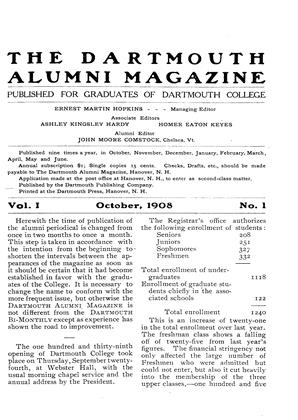Rev. William Winchester Whitcomb died Sept. 11, 1908, at the home of his daughter in New York City (101 West 140th St.), where he and Mrs. Whitcomb had made their home for the last two and a half years. He was born in Grafton, Vt., May 10, 1830, and prepared for college at Townshend, Vt. In 1854-5 he was principal of Salem (N. Y.) Academy, and during the years 1855-63 was a teacher in Ohio, at Zanesville, Wilmington, and New Vienna. During the later years of his teaching he had begun to preach, and was ordained to the Baptist ministry Dec. 3, 1862. He served in the ministry of his denomination in many places of the Middle West, among them Oshkosh, Wis., Red Wing, Hastings, and Owatonna, Minn., Charles City, lowa, Ironton, North Amherst, and Piqua, Ohio, Marshall, Flushing, and Chelsea, Mich., and Greencastle, Ind. He was also for a time in charge of a church in the city of Philadelphia. His long ministry was marked by an unfailing devotion to his work, and was crowned by a good measure of success. The first of the successive strokes of paralysis which finally caused his death was received about nine years ago, and his strength has since gradually failed. Mr. Whitcomb was married Nov. 3, 1857, to Jennie C., daughter of Robert P. Finley of Wilmington, Ohio. Of their four children, two daughters are still living.
The following is taken from a recent issue of The Nation:
"The Battle of Gettysburg," by Frank Aretas Haskell, First Lieutenant of the Sixth Wisconsin Infantry, aide to Brig. Gen. Gibbon, and Colonel of the Thirty-sixth Wisconsin Infantry, U. S. V., has been published in Boston under the auspices of the Commandery of the State of Massachusetts, Military Order of the Loyal Legion. The book is an account written a few days after the battle by one who, though only a staff officer, took so prominent a part that he was promoted from a lieutenancy to a colonelcy for his bravery. On the third day of the conflict he happened to be the only mounted man in the field, and, says Gen. F. A. Walker, rode between the two lines, then swaying backward and forward under each other's fire, calling upon the men of the second division to follow him, and setting an example of valor and self-devotion, never forgotten by any man of the thousands who witnessed it." He is a master of good English, and his pictures of the scenes, tragic and at all times humorous, of the three days conflict and of the leading generals are very graphic. Particularly interesting is the description of the council of war held by General Meade in the bedroom of a little farmhouse; and it would be difficult to find a more thrilling narrative than his account of the repulse of the final assault. Colonel Haskell was tilled in the battle of Cold Harbor, and about fifteen years later, this story, written for his brother, was printed for private circulation. In 1898 it was reprinted in the history of the class of 1854, Dartmouth, of which he was a member. These editions were so small that they attracted little attention. It is now printed again "as an incentive to patriotic thought. It is a pamphlet of a hundred pages, with a portrait of the author and his plan of the positions on the battlefield at noon, July 2.
Secretary, Benjamin A. Kimball, Concord, N. H.
 View Full Issue
View Full Issue
More From This Issue
-
 Article
ArticlePRESIDENT TUCKER'S ADDRESS AT THE OPENING OF COLLEGE
October 1908 -
 Article
ArticleHerewith the time of publication of the alumni
October 1908 -
 Article
ArticleFOOTBALL
October 1908 -
 Article
ArticleCOLLEGE NOTES
October 1908 -
 Class Notes
Class NotesLOCAL ASSOCIATIONS
October 1908 -
 Class Notes
Class NotesCLASS OF 1905
October 1908 By Edgar Gilbert
Benjamin A. Kimball
-
 Class Notes
Class NotesCLASS OF 1854
May, 1909 By Benjamin A. Kimball -
 Class Notes
Class NotesCLASS OF 1854
February, 1910 By Benjamin A. Kimball -
 Class Notes
Class NotesCLASS OF 1854
November, 1910 By Benjamin A. Kimball -
 Class Notes
Class NotesCLASS OF 1854
January 1916 By Benjamin A. Kimball -
 Class Notes
Class NotesCLASS OF 1854
April 1917 By Benjamin A. Kimball -
 Class Notes
Class NotesClass of 1854
December, 1919 By Benjamin A. Kimball
Class Notes
-
 class notes
class notes1962
JANUARY | FEBRUARY 2019 -
 Class Notes
Class Notes1952
JANUARY 1973 By E. F. TEEVENS 2ND, ROY T. ABBOTT JR. -
 Class Notes
Class Notes1935
June 1949 By HENRY R. BANKART JR., FREDERICK T. HALEY, ROBERT W. NARAMORE -
 Class Notes
Class Notes1951
May 1961 By LOYE W. MILLER, JAMES V. ROBINSON -
 Class Notes
Class Notes1917
March 1945 By MOTT D. BROWN JR., DONALD BROOKS -
 Class Notes
Class Notes1990
Sept/Oct 2002 By Ramzi Nemo


